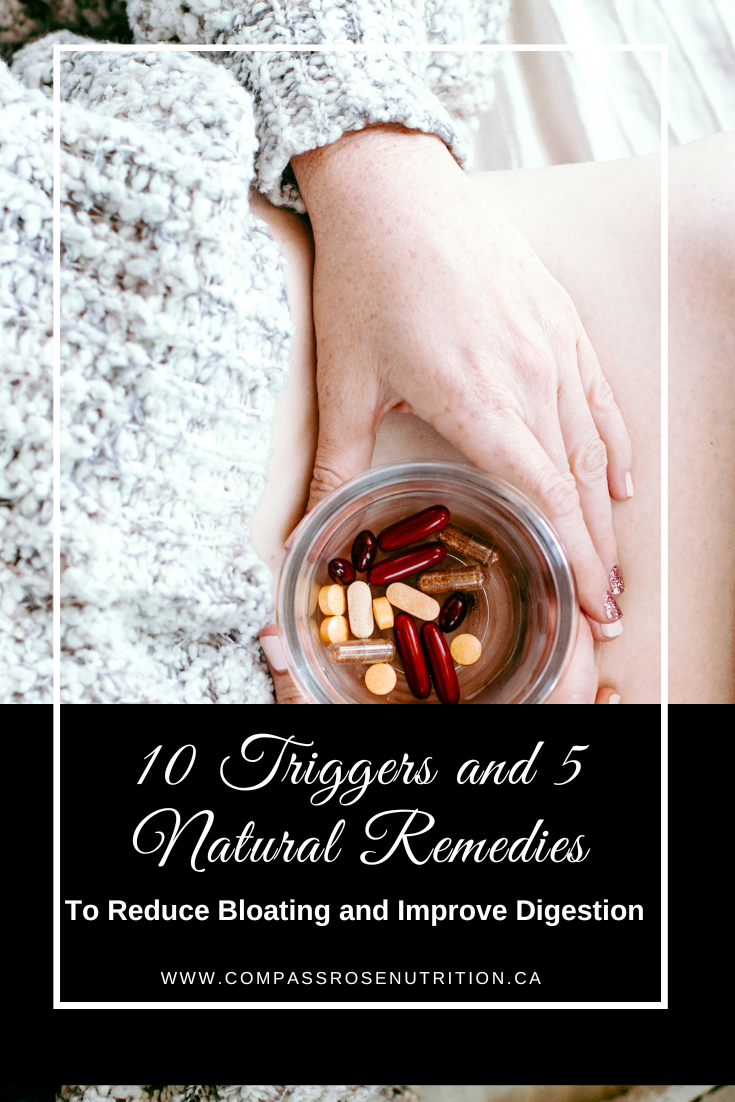Bloating has a sneaky way of creeping in at the worst times—whether you're getting ready for a big event or simply want to feel comfortable in your own skin. One minute you’re fine, and the next, your stomach feels tight, heavy, and uncomfortable. It’s frustrating, often unpredictable, and for many women, it’s an ongoing struggle.
I know this feeling all too well because I used to suffer from bloating regularly. It left me feeling sluggish, uncomfortable, and always second-guessing my food choices or action.
The truth is, bloating isn’t just random. It’s your body’s way of communicating that something’s out of balance. Whether it’s stress, certain foods, or digestion habits, bloating is often a sign that your gut needs a little extra care.
In this post, I’ll walk you through the top culprits behind bloating and share my favorite natural remedies to ease the discomfort. Small, mindful shifts can make a big difference—and you'll be amazed at how much lighter and energized you can feel.
10 Triggers Behind Bloating
1. Eating Too Fast
Life moves fast, and for many of us, meals are no exception. Eating on the go or while multitasking often leads to swallowing air along with your food, contributing to bloating. Plus, when you rush, you’re less likely to chew thoroughly, making digestion harder.
Try this: Slow down. Take smaller bites, chew your food completely, and make mealtime a single-task activity. Even setting aside just 15 minutes to eat mindfully can make a significant difference.
2. Overdoing Processed Foods
Highly processed foods—those chips, crackers, packaged snacks, and convenience meals—can be sneaky triggers for bloating. Many contain hidden sources of sodium, artificial ingredients, or sugars like high-fructose corn syrup that your gut struggles to break down.
Rather than focusing on cutting everything out, shift toward whole foods your body recognizes and processes more easily. Think fruits, vegetables, whole grains, and lean proteins. These nourish your body and support smoother digestion.
3. Hidden Food Intolerances
Sometimes, bloating is your body’s way of telling you that certain foods aren’t sitting well. Common culprits include lactose (found in dairy), gluten (in wheat, barley, and rye), and fermentable sugars in foods like onions, beans, and apples.
If you suspect something’s off, consider keeping a food journal. Track what you eat and how you feel afterward. Over time, patterns may emerge, helping you pinpoint foods that might need to be limited or replaced.
4. Imbalanced Gut Bacteria
Your gut is home to trillions of bacteria that play a crucial role in digestion. When this delicate balance is disrupted—due to stress, antibiotics, illness, or a lack of fiber—it can lead to gas and bloating.
To restore balance, focus on incorporating probiotic-rich foods like yogurt, kimchi, sauerkraut, or kefir. Pair them with prebiotic foods like garlic, bananas, and oats, which feed those beneficial bacteria.
5. Constipation
It might seem obvious, but bloating often follows when things aren’t moving through your digestive system regularly. Constipation can result from dehydration, a low-fiber diet, sedentary lifestyle, or even stress.
Start with hydration—many people simply don’t drink enough water, which slows digestion. Next, add fiber-rich foods like veggies, fruits, and whole grains to your meals. And don’t underestimate movement: even a daily walk can stimulate your digestive system.
6. Stress and Your Gut Connection
Stress doesn’t just live in your mind—it has a direct impact on your digestive system. When you’re stressed, your body redirects energy away from digestion, leading to discomfort, bloating, and irregularity.
Incorporating stress management techniques like deep breathing, meditation, or gentle yoga can calm your nervous system and support digestion. Start small—even a few deep breaths before meals can signal to your body that it’s time to rest and digest.
7. Carbonated Drinks and Artificial Sweeteners
It might seem harmless, but those bubbly sodas or sparkling waters can be a sneaky source of bloating. The carbonation introduces extra gas into your system. Similarly, sugar substitutes like sorbitol or xylitol—commonly found in sugar-free gum and candies—can ferment in the gut, leading to discomfort.
Simple swap: Opt for still water or herbal teas instead, and use natural sweeteners like honey or maple syrup in moderation. These small tweaks can have a big impact.
8. Irregular Eating Patterns
Skipping meals or eating at inconsistent times throws off your digestive rhythm. Your body thrives on predictability, and irregular eating habits can leave your gut struggling to keep up.
Aim to eat at roughly the same times each day, and avoid going long stretches without food. This keeps digestion running smoothly and helps prevent overeating, which can also cause bloating.
9. Hormonal Shifts
For many women, bloating is tied to hormonal fluctuations—especially around the menstrual cycle. Changes in progesterone and estrogen can slow digestion and cause water retention, leading to that uncomfortable feeling of fullness.
While you can’t control your hormones, you can support your body by staying hydrated, focusing on fiber-rich foods, and incorporating gentle movement during these times.
10. You Might Be Overdoing “Healthy” Foods
Sometimes even the healthiest choices can leave you bloated—especially if you introduce them too quickly. Foods like broccoli, kale, beans, and lentils are packed with nutrients, but they can produce gas as your body breaks them down.
If this sounds familiar, try cooking these foods instead of eating them raw. Cooking softens the fibers, making them easier to digest. You can also introduce them gradually, giving your gut time to adjust.
It’s important to identify and avoid trigger foods and we are all unique so keeping a food diary and help you pinpoint which foods are causing your bloating. Once you can identify them, you can more easily avoid them. Common culprits include dairy, gluten, legumes, and cruciferous vegetables like broccoli and cauliflower. By focusing on a balanced diet with fruits, vegetables, whole grains, and lean proteins, you can support healthy digestion and reduce bloating. Drinking plenty of water is also essential for maintaining hydration and aiding digestion.
Now that we’ve covered some of the common causes of bloating, let’s shift focus to practical, natural remedies that can help ease the discomfort. While it’s important to address the root causes, these remedies can help support your digestion and provide relief when you need it most. Try incorporating one or more of these simple steps into your routine for a lighter, more comfortable feeling.
5 Natural Remedies to Help Ease Bloating
Ginger
Ginger is known for its anti-inflammatory properties and its ability to calm the digestive system. Studies suggest that ginger can ease nausea and reduce bloating and gas.
Try this: Add fresh ginger to your smoothies or stir-fries, or enjoy ginger tea after meals to help reduce bloating and discomfort.
Peppermint Tea
Peppermint tea is a highly effective natural remedy for bloating due to its antispasmodic properties. It helps relax the muscles of the digestive tract, reducing bloating and gas.
Try this: Sip on a cup of peppermint tea after meals to help ease bloating and discomfort.
Probiotics
Probiotics are beneficial bacteria that support digestion and help reduce inflammation in the gut. Adding probiotics to your routine can improve digestion and reduce bloating.
Try this: Incorporate probiotic-rich foods like yogurt or kefir into your diet, or consider taking a probiotic supplement to support your gut health.
Fennel Seeds
Fennel seeds have been used for generations to relieve bloating and improve digestion. They contain compounds that relax the muscles of the digestive tract and reduce bloating.
Try this: Chew on fennel seeds after meals or brew fennel tea to help alleviate bloating.
Exercise
Exercise helps stimulate digestion by promoting movement in the digestive tract. Even light activity can reduce bloating and help food move more efficiently through your system.
Try this: Go for a short walk after meals to help support digestion and relieve bloating.
By incorporating these natural remedies and identifying your bloating triggers, you can take control of your digestive health and feel more at ease in your body. Small, consistent changes can make a big difference in reducing bloating, improving digestion, and boosting your energy. Remember, every body is different, so listen to yours and make adjustments as needed. If you experience persistent or severe bloating, it’s always a good idea to consult a healthcare professional to rule out any underlying issues. Here’s to feeling lighter, more energized, and ready to take on whatever comes your way!
Struggling with low energy, stress, or unhealthy habits? Nourish & Thrive is a 30-day guided reset to help you regain energy, build confidence in your choices, and create lasting health habits—without feeling overwhelmed. With simple, effective strategies, you’ll nourish your body and mind for long-term wellness. Click here to get started: Nourish & Thrive Program!





